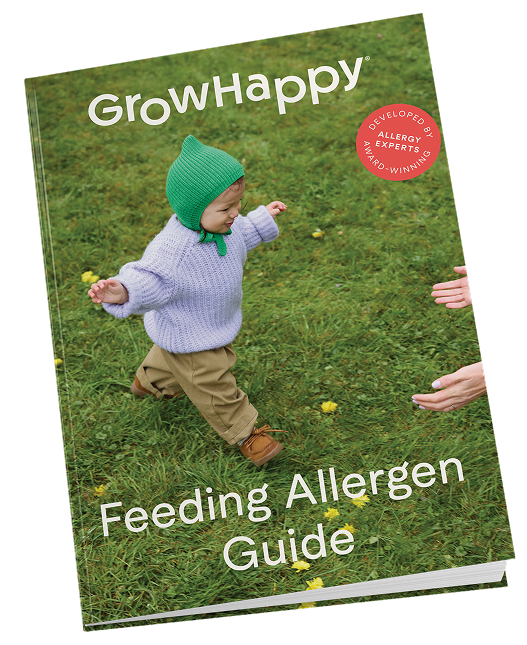October is Eczema Awareness Month, a time to spotlight the critical link between eczema, food allergies, and asthma — and why early, proactive steps during infancy matter for lifelong health.
Eczema: More than a skin condition
Eczema, or atopic dermatitis, affects up to 1 in 3 babies and children. It is not only itchy and uncomfortable — it is also the #1 risk factor for developing food allergies and asthma. When the skin barrier is broken, proteins from foods in the environment can seep through, triggering the immune system.
Eczema, food allergies, and asthma are part of the same “allergic family,” often progressing together in what we call the allergic march. If your child has eczema, their chance of developing food allergies is significantly higher — which is why parents should act Early & Often to introduce allergenic foods safely in the first year and continue feeding them regularly for 3-5 years.
What the research shows
As a Pediatric Allergist, I have been treating patients with allergies, eczema and food allergies and researching food allergies for decades. We understand allergens more every day due to landmark studies that many doctors on the GrowHappy ImmunoNutrition Team have lead the charge on:
-
In the LEAP study, introducing peanut early and regularly to infants with severe eczema or egg allergies reduced their peanut allergy risk by over 80%
-
We’ve also shown in studies that introducing egg early, particularly in infants with eczema, also reduces the chance of developing egg allergy.
-
Yet, 25% of children with food allergies had no eczema at all. This is why all infants, not just those with eczema, should have early allergen introduction.
The message is clear: The most proven way to teach the immune system is to eat them early and often.
Why awareness matters in October
Eczema Allergy Awareness Month is more than awareness — it’s about action:
-
For families: Know that eczema is a risk factor, but also an opportunity to intervene before there are more problems.
-
For clinicians: Use eczema as a red flag to support families in early allergen introduction and good skin care.
-
For society: Recognize the mental health toll — especially for parents. Research shows that parents of children with eczema and food allergies face higher stress, anxiety, and even elevated blood pressure. Awareness and support can lighten that load.
If Your Child Has Eczema:
-
Your child is at higher risk of developing a food allergy. Fight the fear and let this motivate you to protect your child by introducing allergens to the gut in the first year of life from 4-6 months old and keep them in the diet. The most proven way to teach the immune system is to eat them early and often.
-
Talk to your allergist about applying Vaseline to the eczema (especially on the face) before feeding
-
If your child has eczema that is early onset, persistent, severe, and/or slow to respond to treatment, these patients carry a higher risk for food allergy. In these cases, you may want to see an allergist to discuss food allergies before introducing any major allergens.
-
Seek a doctor for advice on how to control the eczema and about how to get allergens in safely
Always be prepared
Allergic reactions are a common concern. But, the first year of life is the safest time to introduce common allergens, as reactions are milder in infants and often consist of simple hives or vomiting. That said, it’s always better to be over-prepared and have medication on hand. Allergy experts recommend antihistamines such as Children's Zyrtec (Cetirizine), as it is fast-acting and non-drowsy.
Most allergic reactions occur within 30 minutes of eating, and nearly all immediate-tyре (IgE-mediated) allergic reactions are within two hours of consuming the food. If you do see signs of an allergic reaction, stop feeding the food and consult a doctor.
Eczema Allergy Awareness Month is a reminder that eczema is not “just skin.” It is a signal to act Early & Often with allergens — protecting the skin, introducing allergens, and giving every child the best chance at a healthier future.
IMPORTANT: Statements made in this article have not been evaluated or approved by the Food and Drug Administration. The information in this article is provided as a general information resource only, and nothing in the content, products or services should be considered, or used as a substitute for, medical advice, diagnosis or treatment. This information in this article is not medical advice, and should not be treated as such. This information is not intended to be a substitute for professional diagnosis and treatment. Please consult your health care provider before making any healthcare decisions or for any guidance.









